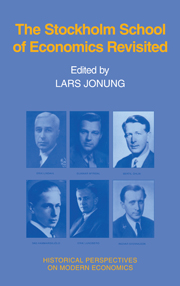Book contents
- Frontmatter
- Dedication
- Contents
- Preface
- List of Contributors
- Dramatis Personae at the end of 1937
- Introduction and Summary
- Part I The roots
- Part II The approach of the Stockholm School
- 4 Expectation and plan: The microeconomics of the Stockholm School
- Comment
- 5 Sequence analysis and optimization
- 6 There were two Stockholm Schools
- 7 On formal dynamics: From Lundberg to chaos analysis
- 8 Lundberg, Keynes, and the riddles of a general theory
- 9 Macrodynamics and the Stockholm School
- 10 Ohlin and the General Theory
- 11 The monetary economics of the Stockholm School
- 12 The Austrians and the Stockholm School: Two failures in the development of modern macroeconomics?
- 13 The political arithmetics of the Stockholm School
- 14 After the Stockholm School
- Part III The impact of the Stockholm School
- Part IV What remains of the Stockholm School?
- The Stockholm School: A non-Swedish bibliography
Comment
Published online by Cambridge University Press: 05 July 2013
- Frontmatter
- Dedication
- Contents
- Preface
- List of Contributors
- Dramatis Personae at the end of 1937
- Introduction and Summary
- Part I The roots
- Part II The approach of the Stockholm School
- 4 Expectation and plan: The microeconomics of the Stockholm School
- Comment
- 5 Sequence analysis and optimization
- 6 There were two Stockholm Schools
- 7 On formal dynamics: From Lundberg to chaos analysis
- 8 Lundberg, Keynes, and the riddles of a general theory
- 9 Macrodynamics and the Stockholm School
- 10 Ohlin and the General Theory
- 11 The monetary economics of the Stockholm School
- 12 The Austrians and the Stockholm School: Two failures in the development of modern macroeconomics?
- 13 The political arithmetics of the Stockholm School
- 14 After the Stockholm School
- Part III The impact of the Stockholm School
- Part IV What remains of the Stockholm School?
- The Stockholm School: A non-Swedish bibliography
Summary
Earlier, perhaps somewhat too much was claimed for the achievements of the Stockholm School. The danger now is a reaction that goes much too far the other way. The issue is not whether all of of the Keynesian model had been anticipated and laid out clearly before the appearance of the General Theory. Of course, the two sets of writing differed in content and in approach, so that while there was overlap, neither can be deemed a replication of the other. And in any event, it seems to me that argument over the proper assignment of priority a half century earlier is not a terribly significant exercise.
Rather, it seems clear that the Stockholm School did make a contribution to ways of thinking about macroproblems that was important and that was uniquely its own. The way of analyzing intertemporal developments that emerged in Sweden in the 1930s made it necessary for the entire discipline to revise its approach to the pertinent subjects. The formal dynamic literature that flourished in the early postwar period and is reemerging now owed little to Sweden in terms of its formal mathematics. But in terms of understanding why the models behaved as they did and how well they did or did not illuminate reality, all of us owe a heavy debt to the earlier Swedish writers, perhaps Erik Lundberg most notably.
- Type
- Chapter
- Information
- Publisher: Cambridge University PressPrint publication year: 1991

